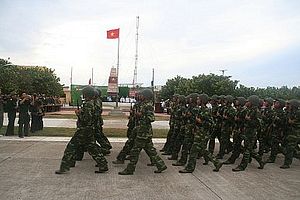Last week, Vietnam and the UK held the second iteration of a new bilateral defense policy dialogue that first convened in 2018. While the meeting was just one of several within the broader UK-Vietnam strategic partnership, it nonetheless highlighted some of the activity within a defense relationship that has been making inroads amid wider domestic and foreign policy developments.
The United Kingdom and Vietnam have a bilateral relationship that also includes a defense aspect as well. Both sides had been cooperating in several areas, including the U.K.’s sharing of its expertise to help Vietnam in its first UN peacekeeping mission in South Sudan. This comes amid a series of other wider developments for both countries, with Vietnam continuing to advance ties with various major powers and preparing to hold the annually rotating chairmanship of ASEAN in 2020 and the UK looking to strengthen its presence in Southeast Asia and the wider Indo-Pacific region despite concerns at home including Brexit.
One of the landmark developments in the defense aspect of the relationship was the setting up of a new UK-Vietnam defense policy dialogue. During the first iteration of the dialogue, which was held at the deputy ministerial level, the two countries inked a cooperation document on geospace and discussed various areas where collaboration could be furthered, including exchanges, training, and the defense industry.
Last week, the defense aspect of the relationship was in the spotlight again with the holding of the second iteration of the Vietnam-UK defense policy dialogue. The dialogue, which was held in Vietnam on September 30, was co-chaired by Vietnam’s deputy defense minister, Nguyen Chi Vinh, and visiting UK minister of state for defense, Baroness Annabel Goldie.
As with the previous iteration, the second defense policy dialogue saw both sides evaluate the state of their defense cooperation and also discuss issues of mutual concern in the region and the world.
The two sides also discussed ways to further advance their defense collaboration. According to the official account of the interaction by Vietnam’s defense ministry, among the areas were discussed included high-level delegation exchanges, military medicine, UN peacekeeping operations, young officer exchange, hydrography, and English language training.
These areas were in and of themselves not surprising: they largely build off of areas both sides are already working in. And as Vietnam’s defense minister, Ngo Xuan Lich, himself acknowledged in a separate meeting with Goldie, while both sides have been engaging in various ways on the defense side, there still remains a lot more room for security collaboration to develop and to get to a level that it would constitute a pillar in the wider Vietnam-UK relationship.
Nonetheless, as both sides continue to make efforts to advance this aspect of their wider ties, engagements such as the new defense policy dialogue will continue to be important to watch in the months and years that follow. They will give observers a better sense of how efforts to build out this aspect of relations are being implemented and managed amid wider domestic and regional developments.

































